phrases, sayings, proverbs and idioms at
The Phrase Finder
Idioms Quiz - find out which phrases you are getting wrong
 Lots of words don't sound the way you might expect from their spelling and lots of idiomatic phrases don't seem to make much sense.
Lots of words don't sound the way you might expect from their spelling and lots of idiomatic phrases don't seem to make much sense.
Here are 20 idioms that are often said and spelled wrongly.
Take the test - see how many you know.
You've got another coming
 Yes, "You've another think coming" is right.
Yes, "You've another think coming" is right.
 No, it should be 'think', not 'thing'.
No, it should be 'think', not 'thing'.
Wrong as it is, the 'another thing coming' version has become so commonplace that it can only be a matter of time before it becomes accepted. You may even come across the view that "another thing coming" is correct.
It may help to look at the whole phrase. When someone says "if you think that, you've got another think coming" what the speaker means is "if you think that, then your thought is wrong, you need to have another one".
With breath
 That's right, the expression is "With bated breath".
That's right, the expression is "With bated breath".
 Sorry, the correct word is 'bated', not 'baited'.
Sorry, the correct word is 'bated', not 'baited'.
Although it is incorrect, 'baited' is an understandable misspelling; after all, when do we ever come across the word 'bated' apart from in this phrase?
All becomes clear when you realise that 'bated' is just a shortened version of 'abated'. Abated breath, that is, breathing that is restrained, is what is meant by the phrase 'bated breath'.
On hooks
 Yes, that's right. When we are in a state of uncomfortable suspense we are "on tenterhooks'.
Yes, that's right. When we are in a state of uncomfortable suspense we are "on tenterhooks'.
 Sorry "tenderhooks" isn't a word.
Sorry "tenderhooks" isn't a word.
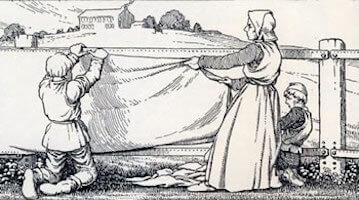 A tenter is a wooden frame used to dry cloth. The wet cloth was fixed to the frame with hooks, hence the expression.
A tenter is a wooden frame used to dry cloth. The wet cloth was fixed to the frame with hooks, hence the expression.
Free
 Yes, that's correct. "Free rein" derives from horseriding.
Yes, that's correct. "Free rein" derives from horseriding.
 Sorry, that's the wrong word.
Sorry, that's the wrong word.
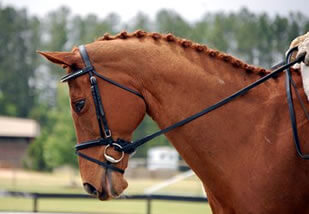 The correct expression is "free rein". The 'rein' in this expression is the strap used by a rider to control a horse. To give a horse 'free rein' is to allow it to run as it will, without restriction.
The correct expression is "free rein". The 'rein' in this expression is the strap used by a rider to control a horse. To give a horse 'free rein' is to allow it to run as it will, without restriction.
of hand
 Yes, that's right. The expression "Sleight of hand" refers to skill at juggling or in manipulating playing cards.
Yes, that's right. The expression "Sleight of hand" refers to skill at juggling or in manipulating playing cards.
 The correct word is 'sleight'.
The correct word is 'sleight'.
 Slight appears to make sense as conjurers use small, that is, slight movements to trick us.
Slight appears to make sense as conjurers use small, that is, slight movements to trick us.
Once you understand that sleight is 'trickery'/'cunning' the correct version of the expression becomes clear. Conjurers use trickery and deceit to fool us and, when they do it using their hands, that's 'sleight of hand'.
your appetite
 Yes, that's correct. To 'whet' means to sharpen.
Yes, that's correct. To 'whet' means to sharpen.
 Sorry, it's 'whet', not 'wet'.
Sorry, it's 'whet', not 'wet'.
Confusingly, although we 'wet our whistle' we 'whet our appetite'. In that case our 'whistle' means our voice or throat and 'wet' has its usual meaning. So, to 'wet our whistle' is to have a drink.
To 'whet' means to sharpen or put a fine point on something (like you would do with a tool on a whetstone}. So, 'whet your appetite' means to sharpen your desire for food.
do
 Yes, that's correct.
Yes, that's correct.
 "Derring-do" isn't exactly the most commonly used idiom any longer and, outside of reviews for old Errol Flynn films, you aren't likely to see it. All the same, it's good to get it right. 'Daring do' isn't a phrase, but 'derring-do' is.
"Derring-do" isn't exactly the most commonly used idiom any longer and, outside of reviews for old Errol Flynn films, you aren't likely to see it. All the same, it's good to get it right. 'Daring do' isn't a phrase, but 'derring-do' is.
 Sorry, it's 'derring', not 'daring'.
Sorry, it's 'derring', not 'daring'.
'Daring do' is a totally understandable mispronunciation. Understandable because 'daring' seems to make sense and because 'derring' is so antiquated a word it no longer exists without its friend 'do'.
Damp
 Yes, that's right.
Yes, that's right.
Squibs are fireworks - not at their best when damp.
 Sorry, it's 'squib', not 'squid'.
Sorry, it's 'squib', not 'squid'.
 It's clear where this very common mistake comes from. Squid live underwater and are duty bound to be damp. That, and the obscurity of the word squib, is possibly what created this misunderstanding.
It's clear where this very common mistake comes from. Squid live underwater and are duty bound to be damp. That, and the obscurity of the word squib, is possibly what created this misunderstanding.
Squibs are fireworks and damp ones are likely to lead to disappointment, hence the expression 'damp squib'.
point
 Yes, that's correct.
Yes, that's correct.
 Sorry, the correct word is 'moot'.
Sorry, the correct word is 'moot'.
'Mute point' isn't really a phrase.
Fall by the side
 Yes, that's correct.
Yes, that's correct.
To 'fall by the wayside' is literally to fall by the side of the road (a.k.a. the way).
 Sorry, the correct word is 'wayside'.
Sorry, the correct word is 'wayside'.
 A wayside is just the side of a path or road. 'Fall by the waste side' might seem to make sense but it is the result of a mishearing of 'fall by the wayside'.
A wayside is just the side of a path or road. 'Fall by the waste side' might seem to make sense but it is the result of a mishearing of 'fall by the wayside'.
This is an old English expression and its best known usage is in the biblical Parable of the Sower - "As he sowed, some fell by the way side".
revenge
 Yes, that's right.
Yes, that's right.
'Exact' in this context means demand or enforce.
 Sorry, it's 'exact', not 'extract'.
Sorry, it's 'exact', not 'extract'.
Counter-intuitive as it is, 'exact revenge' is correct.
An easy one to get wrong as 'exact' here means 'demand', which is not we usually mean by exact. Also, extract seems to be what we do when we get revenge. Nevertheless, it's 'exact revenge'.
cancer
 Yes, that's correct.
Yes, that's correct.
Cancer of the prostate gland - we don't have a prostrate gland.
 Sorry, it's 'prostate', not 'prostrate'.
Sorry, it's 'prostate', not 'prostrate'.
Prostate cancer is cancer of the prostate gland - (good news ladies, you don't have one of them, so that's one less thing to worry about).
Prostrate cancer would be cancer when lying flat on the ground, as if cancer wasn't bad enough already.
Nip in the
 Yes, that's correct.
Yes, that's correct.
The 'nip in the butt' misspelling is most commonly found in the US. The English variant would be 'nip in the bum', but that's rarely used.
 Sorry, the correct version is "Nip in the bud".
Sorry, the correct version is "Nip in the bud".
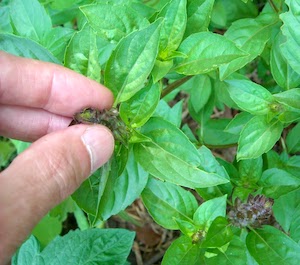 'Nip it in the bud' means to put a stop to a problem while it is still small, the origin being the removal of buds from plants before they begin to form shoots.
'Nip it in the bud' means to put a stop to a problem while it is still small, the origin being the removal of buds from plants before they begin to form shoots.
Of course, if you were in the US and opted to pinch someone's backside, 'nip it in the butt' would be how to talk about it.
goat
 Yes, that's right.
Yes, that's right.
The term is spelled (as one word) 'scapegoat'.
 Sorry, it's 'scape', not 'escape'.
Sorry, it's 'scape', not 'escape'.
 This one is especially perverse as 'scape' is just an archaic form of 'escape'.
This one is especially perverse as 'scape' is just an archaic form of 'escape'.
We don't use 'scape' in preference to 'escape' any longer, except in the spelling of 'scapegoat'.
You might just about get away with claiming that 'escapegoat' is a reasonable variant of 'scapegoat'. However, the sometimes used 'scrapegoat' makes no sense and is unambiguously wrong.
in
 Yes, that's right.
Yes, that's right.
Shoes have nothing to do with this expression.
 Sorry, the correct spelling is 'shoo-in'.
Sorry, the correct spelling is 'shoo-in'.
As 'shoo-in' and 'shoe-in' sound the same and it is easy to understand why the 'shoe' version came to appear in print from time to time. There's also the allusion to door-to-door salesmen who might aim to get a sale by putting a shoe in the door.
Nevertheless, there isn't any connection between this expression and shoes.
The phrase came about as a reference to racehorses that were so sure to win that they could be 'shooed' towards the winner's enclosure.
To all purposes
 Yes, that's right.
Yes, that's right.
It's a shortened form of 'to all intentions and purposes'.
 Sorry, that's wrong.
Sorry, that's wrong.
'To all intents and purposes', means 'in all important and practical ways'.
'Intensive purposes' doesn't appear to mean anything.
more on the meaning and origin of 'For all intents and purposes'...
A around my neck
 Yes, that's correct.
Yes, that's correct.
The expression derives from The Bible, Matthew 18:6.
"But whoso shall offend one of these little ones which believe in me, it were better for him that a millstone were hanged about his neck, and that he were drowned in the depth of the sea."
 Sorry, it's 'millstone', not 'milestone'.
Sorry, it's 'millstone', not 'milestone'.
If you had either a millstone or a milestone hanging around your neck you probably wouldn't care which - they are both heavy stones.
In everyday speech though it's good to get it right. The 'millstone around your neck' derives from a verse in The Bible, Matthew 18:6.
more on the meaning and origin of 'A millstone around your neck'...
At one swoop
 Yes, that's right.
Yes, that's right.
'At one fell swoop' is first found in Shakespeare's Macbeth.
 Sorry, the word is 'fell', not 'fail'.
Sorry, the word is 'fell', not 'fail'.
'At one fell swoop' is hardly something we might hear very often in everyday conversation, it does derive from Shakespeare's era after all, but, if we do say it, we might as well get it right.
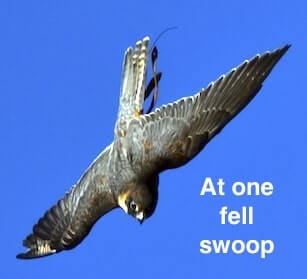 The expression refers to the swoop made by falcons when catching prey. The 'fell' part has a meaning that we aren't familiar with any longer - it means 'cruel/savage'.
The expression refers to the swoop made by falcons when catching prey. The 'fell' part has a meaning that we aren't familiar with any longer - it means 'cruel/savage'.
The association with birds has given rise to several other versions - "at one fowl swoop", "at one fell stoop" etc. These are all incorrect.
Beyond the
 Yes, that's correct.
Yes, that's correct.
The pale (or paling) was originally the fence around a settlement. Inside the pale was 'us' and beyond the pale was 'them'.
 Sorry, the word is 'pale'.
Sorry, the word is 'pale'.
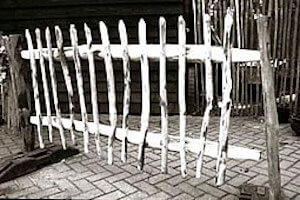 It's 'pale' but that's not the usual 'light in colour' meaning. The paling fence around a settlement is called a pale.
It's 'pale' but that's not the usual 'light in colour' meaning. The paling fence around a settlement is called a pale.
Ours friends were inside the pale and our enemies were 'beyond the pale'.
It's a -dog world
 Yes, that's right.
Yes, that's right.
'A dog-eat-dog world' alludes to the kind of ruthless, red in tooth and claw world of wild animals.
 Sorry, but it's 'a dog-eat-dog world'.
Sorry, but it's 'a dog-eat-dog world'. 
The proverbial expression alludes to the ruthless competition amongst wild animals. It seems rather lacking in real world awareness though as dogs don't usually eat each other.
Stranger still though is a 'doggy-dog-world'. I've no idea what that might be.
How did you do?
If you like this sort of thing and might like to learn a few more check my list of 'phrases that people often get wrong'.
There's also a list of common mistakes about the origins of phrases.
